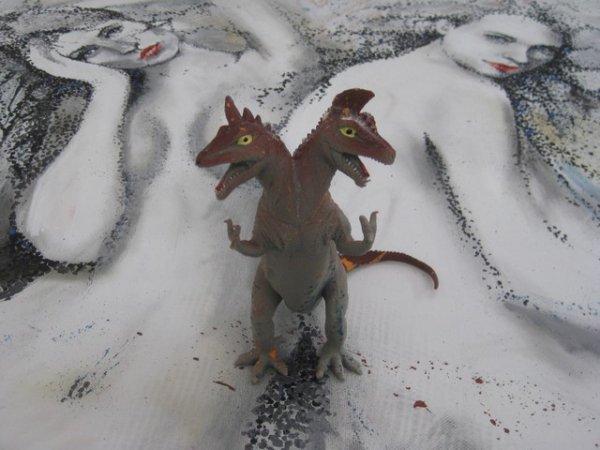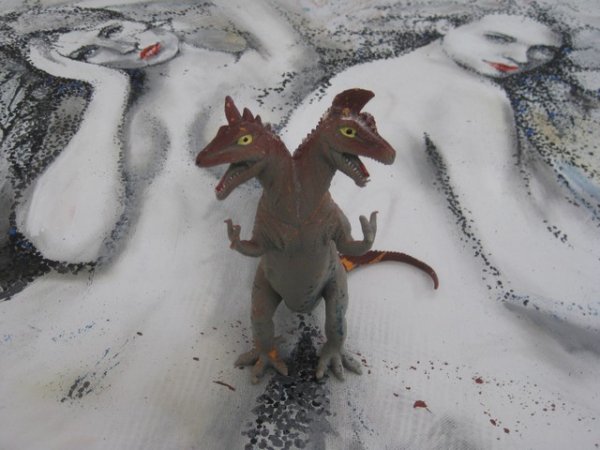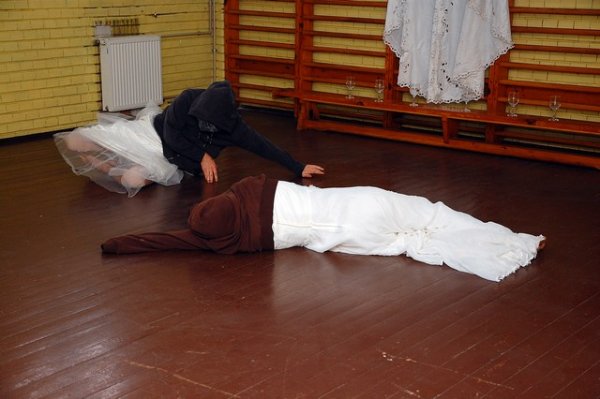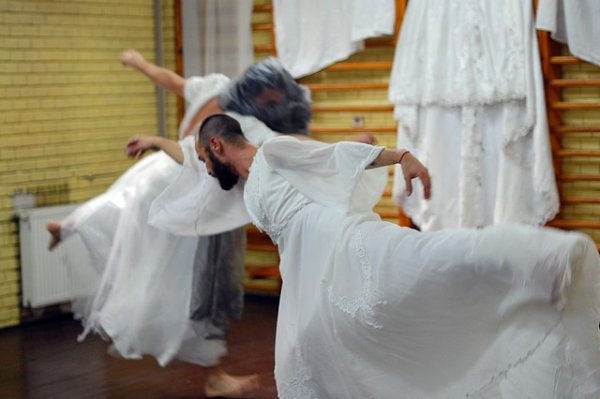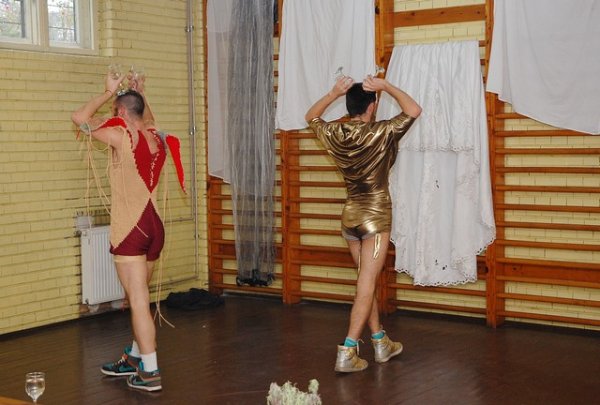Gina Şerbănescu: What was the motivation for your project?
Paul Dunca: Life meets death once in a while. And, all of a sudden people start to think a little bit more about what is there to come. Some say we all need to believe that this is not all. Others hope to relax in something called nothing. Sooner or later we all are going to leave the physical existence, so what will the future bring?
Krassen Krastev: I met Paul Dunca at the Balkan Dance Platform in Ljubljana in April 2011 and his artistic universe and personality gave me the impression that it will be very interesting to do a project together. First we worked with The 4th Age Community Arts Centre and we presented Show Delivery at Moses Rosen in Bucharest, July 2011. This experience gave me the desire to go further and the motivation to work on TEST_a_MENTAL.
Gina Şerbănescu: How did you communicate or influence one another during working?
Paul Dunca: I wanted to work with Krassen because I wanted to have the experience of working with someone I didn't know before and who's not a Romanian. We decided to work together after 5 days we first met. Being similar in many ways means also being very different in others. I think work is about finding consensus which means making out of the differences between us our superhero powers.
Krassen Krastev: The work was based mostly on different propositions, from his part and mine, movement and text improvisations, exchanging ideas about everything concerning the piece. In a way it was simple, even if we have different backgrounds, we are very close, and have a similar taste.
Gina Şerbănescu: How did the communication with 3rd age people shaped and fed your ideas?
Paul Dunca: We documented a lot the subject of our work, most of all by asking people about their expectations for the afterlife. Since two years, I'm a cofounder of the 4th Age Community Arts Centre, which is a community arts centre based in the Moses Rosen Home for Elderly, in Bucharest, Romania, a project with the goal of changing the attitude towards the elderly in Romanian society. So I asked Krassen, as first part of the project, to come over and be a resident here. We didn't have any plan on what to do, so we thought about just being dancers and making a show for the residents of the home. They had to decide for the music, the costumes, the choreography and the concept and we put everything together. The seniors came to rehearsals and were not always happy with what we were doing. It felt a little bit like in school, but in the end we all loved the show. There was one lady, who was responsible with the costumes and she said: "You should dance as naked as possible", so we went topless in the last part of the performance. It was summer and very hot and we two were completely wet. It was very sexy. When Krassen came back to Bucharest in October, before going on with our work in the e-Motional Bodies and Cities Residency in Bacau, we visited Moses Rosen Home to watch together with the seniors the video from the performance in summer. We arrived during a meeting, so we had to wait for 30 minutes and while waiting and smoking a cigarette we met Marina, who actually gave us the main idea of TEST_a_MENTAL.
Krassen Krastev: Sometimes, with my own grandma, I have conversations about life and death, and, yes, it's always interesting to have the point of view of other generations. Show Delivery, was a great experience, and the communication with aged people motivate us to work on the subject of TEST_a_MENTAL which is death, afterlife and rebirth. We wanted to work on this topics but not in a tragic way.
Gina Şerbănescu: Is the performance looking how you projected it to be, or did it change? If the answer is yes, explain the process of creation.
Paul Dunca: I don't think we projected the performance in a kind of way. Actually we worked like blind people for a while and then we tried to put things together. It was like making some sort of outfit out of different clothes you have around. In the end you need to make it look somehow, but while you do it, you just face the mirror.Krassen Krastev: Personally I don't really "project" at the beginning of a process, I have some ideas and images, some notes also, but I like to leave "the door open" for everything that could come with the time, during the rehearsals.
Gina Şerbănescu: Do you have a target group for your performance?
Paul Dunca: No, I want everybody to watch it. I think we try to please everybody with our show while trying to please ourselves. It's a work about hope because that's the last thing that dies.
Krassen Krastev: Not really, I don't think that a performance should have a target group, it should be "open" for every one, but of course, I am aware that some people could be more interested than others, but this is happening often. I was quite surprised when a 85 years old man came to say how much he enjoyed our performance, after the presentation in Bacau.
Gina Şerbănescu: Speak about the main themes/issues of your show...
Paul Dunca: Main themes/issues of our performance: death, love, magic, time and skin. I believe in the total power of love and of magic. Time is something that intrigues me and I work with my body that is dressed up in skin. I also don't want to forget that one day I will die.
Krassen Krastev: Life, death, the after life, love, the body, my own body, emotions and feelings, rebirth and transmigration. These are the main points in the performance, but as we wanted to have a less tragical approach to this topics, for the "death part" of the piece, we have been inspired from the romantic ballets, such as Giselle or Les Silphides, for the "rebirth and transmigration part" we set up a dialog between plants and for the last part of the performance which is about the "afterlife", we try to convince the audience to join us in an old planet, where life after physical death is booming!
Gina Şerbănescu: Do you think that it is important in what country and to what audience it is presented? (In what way)?
Paul Dunca: The performance is in English because we also work with text and me and Krassen do not speak the same language. We are both from the Balkans, so I guess there is something specific about it, even if it is just how our English sounds. But we thought about it very globally and our subject is relevant for most of the people, regardless their nationality.
Krassen Krastev: I think because of the English text we use in the performance, yes, it is important that the audience understand what we are talking about, but at the same time we try to be also very explicit with our bodies, so there is always an impact text - body.
Gina Şerbănescu: Is this a final product or there are things that will be changed? What would change?
Paul Dunca: As a structure, this is our final product at the moment. We like to let it a little bit open, so we might change things as we change also, but we're not sure yet what. I think one should never close one's work and say: "This is it!". I think it's better when you say: "This is it for now!"
Krassen Krastev: Personally the idea of a "final product" regarding a live performance, scares me a bit. For instance the show in Bacau and the one just few days later in Bucharest, were quite different. The space was completely different, we invited Eduard Gabia to play drums, we added a song, etc. So, I think it may be like this for a while, adding new things, or taking out things we don't like anymore.
Gina Şerbănescu: How do you personally relate to the topics of the show?
Paul Dunca: We tried to go very personally in the work and it's basically what we believe for ourselves about our afterlife. I strongly believe in what Marina said: "Life never stops!"Krassen Krastev: The death, the afterlife and rebirth are the main topics in this performance. In a way, questioning all that helps me to see life in a different manner. There are many scientific approaches which are giving explanations of those phenomena, and yet my own point of view is that questioning about death, afterlife and rebirth makes me regard life in a more intense way. It's as the last sentence in the performance: "Look life in the face, always in the face..."
TEST_a_MENTAL
by/with: Paul Dunca & Krassen Krastev
costumes: Diana Bobina & Katia Guzun, Fe[Male]
Project produced with the support of the Gabriela Tudor Foundation, in the frame of the E-MOTIONAL Bodies & Cities programme / ArtistNe(s)t residencies, George Apostu Cultural Centre Bacau, Romania 2011
Photo: Dani Ioniţă (at 4th Age Community Arts Centre)
